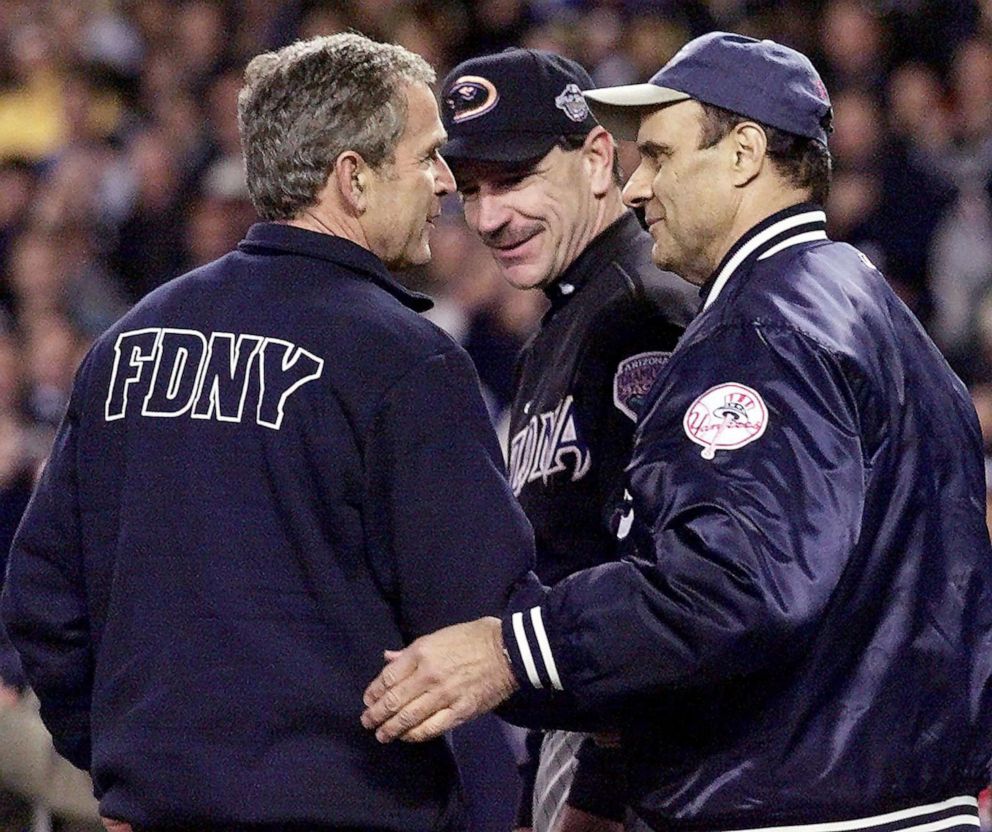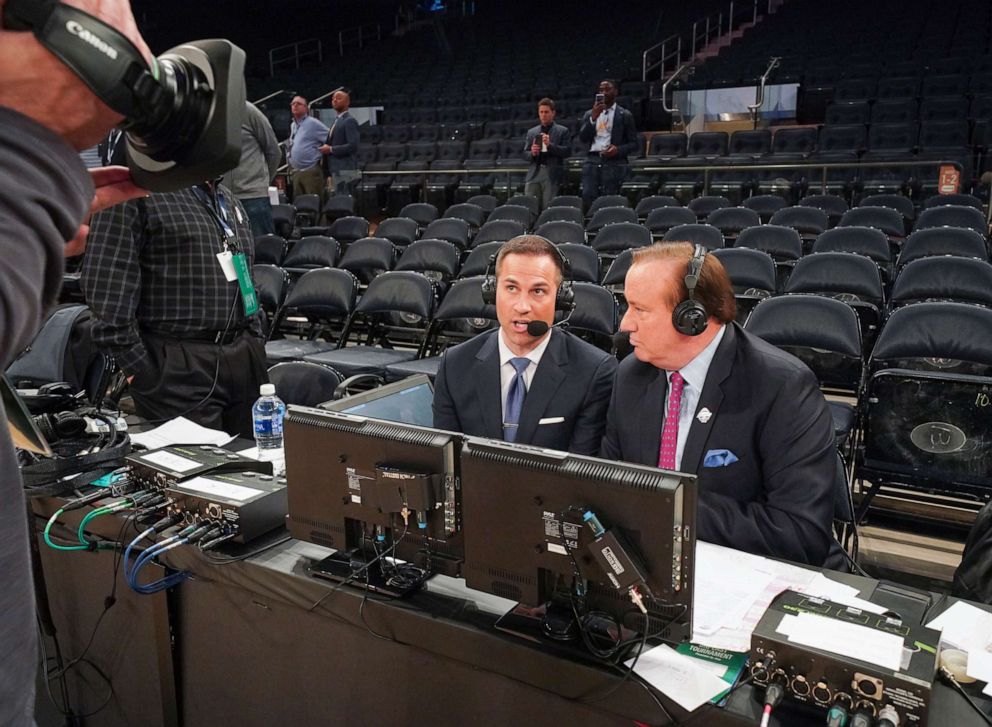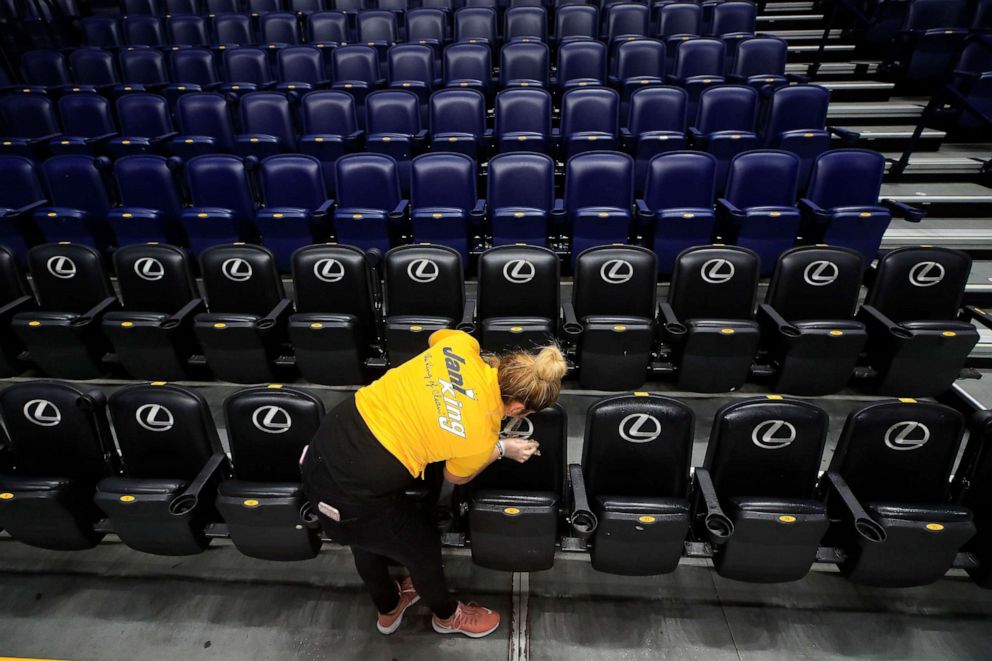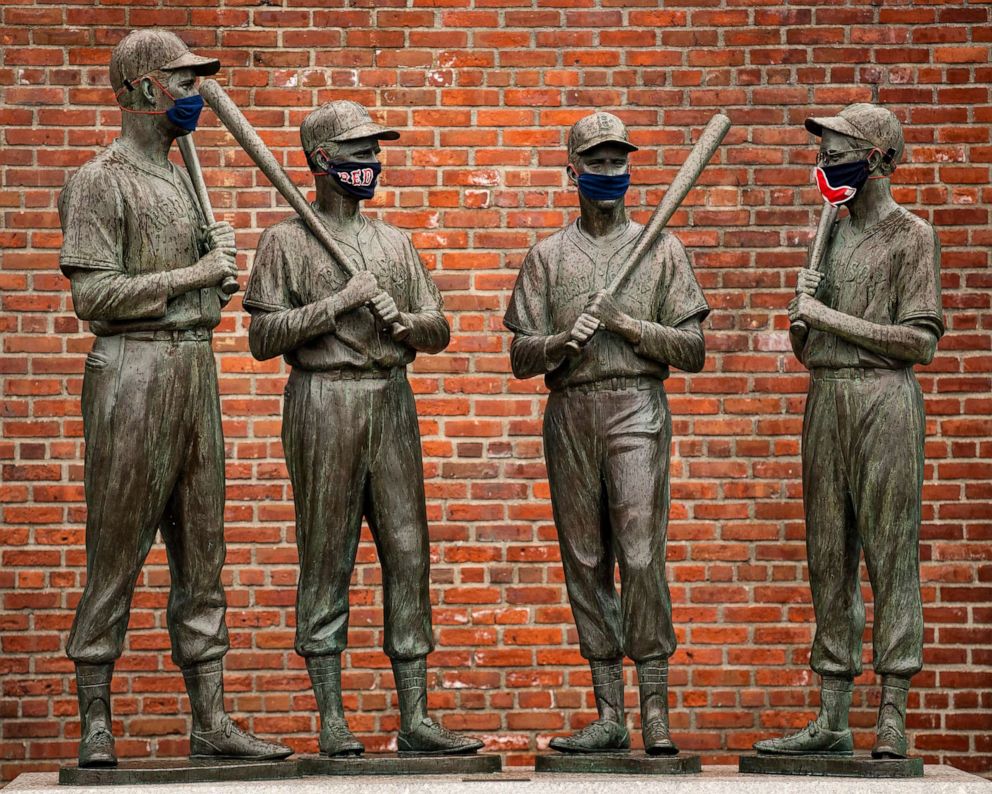An unexpected loss: Confronting a world without sports amid the coronavirus pandemic
Fans and athletes are dealing with the sudden suspension.
As Americans cope with quarantine and a barrage of economic and health concerns amid the coronavirus pandemic, sports fans have lost an avenue for escape as sporting events on all levels have been postponed or canceled.
Throughout history Americans have turned to sports during difficult times.
A month after the 9/11 terror attacks, President George W. Bush walked to the mound at Yankee Stadium wearing a bulletproof vest under his coat before Game 3 of the 2001 World Series and threw the first pitch -- in a signal to America that the country can heal.
Tune into ABC at 1 p.m. ET and ABC News Live at 4 p.m. ET every weekday for special coverage of the novel coronavirus with the full ABC News team, including the latest news, context and analysis.

As a timeline for the return to normalcy remains unclear, sports journalist and ABC News commentator Christine Brennan said that during the coronavirus crisis, the sports world "has become much more a mirror of our society," as opposed to an "escape" from our daily lives.
Athletes from around the sports world have tested positive for COVID-19 and many players and leaders in the sports world have focused on raising money and securing resources for organizations and states battling the outbreak.
NBA players Kevin Love, Giannis Antetokounmpo and Zion Williamson are donating thousands of dollars to cover the salaries of workers at NBA arenas impacted by the suspension; New England Patriots owner Robert Kraft helped Massachusetts purchase 1.7 million N95 masks from China, and sent the Patriots plane to transport them to the U.S; and MLB, which partnered with Fanatics, has halted the production of MLB uniforms to produce at least 1 million masks and hospital gowns for health care workers.
"I think athletes have really risen to the challenge and really understand their place in society and right now, as much as sports would be a lovely diversion, there's no place in our world right now for sports and as it should be," Brennan said. "When you have a worldwide pandemic, sports seems to take a backseat."
''The watershed moment'
The chain reaction began in a surreal moment on March 11 when the NBA announced the suspension of the 2019-20 season until further notice after Utah Jazz center Rudy Gobert became the first player to test positive for COVID-19.
"The NBA was really the watershed moment," Brennan said. "When that NBA suspended operations, I think we will all remember where we were when we saw that. I was at a dinner and looked at my phone and couldn't believe it. That was really the wakeup call."
A day later, the NHL announced that it was pausing its 2019–20 season and MLB announced the cancelation of the remainder of its spring training games and a delay to the start of the season. The day culminated in the National Collegiate Athletic Association canceling March Madness.

"The day the sports world stopped," flashed across the screen on ESPN the evening of March 12 while visibly stunned commentators marveled at the real-time domino effect of cancellations.
Brennan told ABC News that the "sports world really led the way and showed our culture" that the coronavirus pandemic was "very serious" and is "something to sit up and pay attention to."
On the day the NBA suspended the season ,there were about 1,267 cases of the coronavirus in the U.S. and 38 deaths. The White House still had not announced federal social distancing guidelines, which came five days later and have now been extended until April 30.
"In many ways, as the White House and many others were ignoring or downplaying the coronavirus, the sports world got everyone's attention," Brennan said. "The sports world became our North Star by the dominos falling so quickly."
As of Friday, the U.S. had more cases and deaths than any country in the world, with at least 706,000 diagnosed cases and at least 37,000 deaths.
'Sports are a great thing for this country'
Over the past few weeks, sports networks have been airing old games, documentaries and commentary about the developments that remain, including the NFL draft, which according to Commissioner Roger Goodell, is set to take place virtually April 23 to 25 as clubs and club facilities remain closed.
Sporting events from marathons and golf tournaments, to cricket and soccer were canceled around the world. And amid the social distancing guidelines in the U.S., college, high school and recreational sports were suspended, impacting athletes of all ages. Even the 2020 Olympics, which were set to be held in Japan this summer, have been postponed to 2021.
Dr. Joel Fish, a licensed sports psychologist who has worked with athletes on all levels -- from NBA stars and Olympians, to children -- said that a world without sports is "very disruptive" to both athletes and fans.
"I think we're all creatures of habits, we all have our routines, we all have some sense of normalcy and this has been the perfect storm for disrupting all that," Fish told ABC News, adding that cancelations have added to the "anxiety" and "uncertainty" that people are feeling during the pandemic.

Fish noted that "hardcore fans" -- those who fulfill their needs for social interactions, entertainment, stress relief and distractions through sports -- are the most emotionally impacted.
And based on what needs sports fulfill in a person's life, "what fans are scrambling for right now" is "finding a way to fill the void," he added.
President Donald Trump, an avid golfer, was asked about the Masters being postponed until November during a White House coronavirus task force briefing last week, and he reflected on the void that sports cancellations have left in the lives of fans.
"I looked the other day. I saw somebody. I saw, ‘Wow, he looks great.' I forgot. Then I said, ‘Oh, that was nine years ago.' ... You get tired of looking at 9-year-old baseball games and playoff games that took place 12 years ago," Trump told reporters. "I don't have much time to do that, frankly, but that's what people are doing and they want to see sports."
"Sports are a great thing for this country," Trump continued, adding that he hopes "football is able to start" and that "baseball can get to play a little bit."
'I wish all of this was just a dream that I could wake up from'
Although fans are missing out, for athletes themselves -- particularly rising stars who were relying on this season for a scholarship or a chance to play professionally -- the loss is much greater.
Fish, who is the director of the Center for Sport Psychology in Philadelphia, was working with an NBA team and a number of Division I teams when the cancellations were announced.
The extent of the despair was particularly palpable in the barrage of social reactions from NCAA basketball players, especially seniors.
"I wish all of this was just a dream that I could wake up from ... Wish i could play one more game with my brothers," Dayton University senior Trey Landers wrote on Twitter. His team was on pace to be a No. 1 seed in the tournament.
"I'm broken.... my college journey is really over, thank you Oregon," Oregon Ducks guard Minyon Moore tweeted.
And Kelly Graves, the head coach of the Oregon Ducks' women's basketball team, tweeted, "It appears our ‘unfinished business' will remain just that. Disappointed but I completely understand. I love & I hurt for my team."
Fish said that at the center of the struggle is a feeling of "loss" and part of his work with athletes, their parents and coaches is how to "come up with a game plan" to confront that loss and find "closure."
"A whole range of feelings get triggered by that and a lot of loss and a lot of what-ifs," Fish said. "The fact that there isn't closure to [the season] will maybe lead these folks wondering five or 10 years from now, 'What if I had an opportunity to play that game? What if I didn't miss that moment?'"

And according to Fish, this is especially difficult for parents of young stars: "Parents won't get to see their kids have a certain opportunity and tryouts and games and other chances where maybe their family has invested a lot of time, energy and money to see it play itself out."
The NCAA Division I Council granted an extra year of eligibility to all student-athletes in spring sports, who lost their entire season, including baseball, softball, tennis, golf, outdoor track and field and lacrosse. But the decision does not apply to winter sports like basketball, hockey, gymnastics or swimming.
"I'm not spending one second thinking about multi-millionaire professional athletes or billionaire owners," Brennan said. "I'm thinking about those high school kids who just lost their last chance for spring sports, those high school seniors, the college seniors who lost their opportunities for the basketball tournaments and those athletes on the rise. The college baseball player who was hoping to get drafted. The athlete who was hoping his senior year in high school would get them a scholarship, a softball player who knew she needed a really good season."
And as they cope, Fish said that athletes and coaches are turning to the skills they learned in the game.
"With sports we're always talking about controlling what you can and how can you be the calm in the midst of the storm. In many ways, athletes have a lot of coping skills," he said, adding that he has been counseling teams through virtual video meetings on Zoom during the pandemic. "We can draw on sports to help us cope. I really do believe that ... we celebrate together, we work toward a common goal, we stick together through adversity."
What to know about coronavirus:
- How it started and how to protect yourself: Coronavirus explained
- What to do if you have symptoms: Coronavirus symptoms
- Tracking the spread in the U.S. and worldwide: Coronavirus map




